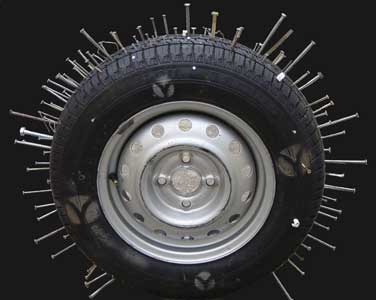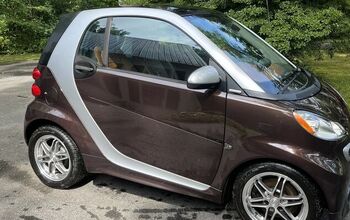4 Views
Smart Cars Need Smart Tires
by
Frank Williams
(IC: employee)
Published: December 21st, 2007
Share
Smart cars that keep themselves in the proper lane, maintain the correct following distance and sense driver fatigue are so passe. Now, thanks to researchers at Purdue University, your smart car can have smart tires. Reuters reports the net technology incorporates sensors that can detect problems like cuts, leaks, imbalance and improper mounting. A chip inside the tire probes the layers of the tire and relays information. The developer plans to patent the technology and license it to tire makers. He said it would cost the manufacturers about $1 per tire, but expects it'll add about $50 to the cost of a tire by the time it gets into consumers' hands. How smart is that?
Frank Williams
More by Frank Williams
Published December 21st, 2007 11:23 AM






















![2016 Smart Fortwo Review - Honey, I Shrunk The Car [Video]](https://cdn-fastly.thetruthaboutcars.com/media/2022/07/19/9237273/2016-smart-fortwo-review-honey-i-shrunk-the-car-video.jpg?size=350x220)











Comments
Join the conversation
miked: right on. Virtual Insanity : i was thinking the same thing. my brain just keeps saying "booster seats for 12 year olds...booster seats for 12 year olds..."
The rubber that rubs off tires every day causes a lot of particulate pollution. They should work on a tire that doesn't do that.
miked: In a competitive situation, the price of a product should reflect its cost of production, which includes a reasonable return on the capital invested. Only in a monopoly situation can prices be geared towards the value each individual consumer, or class of consumers, places on the product, irrespective of the unit cost of production. This behavior, which you describe in your software example, is called "price discrimination." In your case, it is a perfectly legitimate monopoly behavior, because the patent and copyright laws give creators exclusive control over their inventions for a limited period, which means that they can market them like a good monopolist would (whether the never-ending extension of copyright protections -- now near the century mark -- violate the spirit of the constitutional clause enabling the Federal Government to protect copyrights is a discussion for another board). Depending on the circumstances, that means price discrimination is a possibility. If price discrimination is not possible (because there is no way to target different categories of users), then the monopolist will just set production levels lower than a competitve market would, reap some monopoly rents, but the truly deep-pocketed customers who really need the product will end up paying less than their highest theoretical bid for the product, and will obtain some "consumer surplus" (the difference between what something is worth to the consumer versus what he actually had to pay for it). The benefits of a competitive market are that price is lowered, quantity maximized, and thus consumer surplus is maximized. Justification for monopolies is that when upfront or R & D costs are high, while the cost to produce each individual unit is low, nobody would step in and make the upfront investment without some guarantee that he'd recover his money, and thus the product would never exist at all -- a state of affairs worse than even a monopoly. One way to practice price discrimination with the invention we're discussing here would be to increase the cost of the system as the tires get larger, even if the production costs do not increase much (or at all) as the size of the tire goes up, on the theory that larger tires generally get put on larger, more expensive vehicles that get sold to richer, more free-spending types of people. Someone buying tires for his Tercel might spring for this feature if it added no more than $10 to the cost of each tire (still above the actual cost, which is $1), while someone driving a Lincoln Navigator might pay $60 more per tire. Why make the premium over a regular tire a uniform $50, when that would lose the business of the Tercel driver while not soaking the Lincoln driver enough? Your profits would only be $196 under a uniform pricing plan, while under price discrimination they'd be $272. Since this device is properly covered by a patent (I'm assuming), then this sort of behavior is perfectly legitimate for the life of the patent. One the patent expires, everyone and his Chinese grandmother will make these devices and the monopoly premiums will disappear in each market segment.